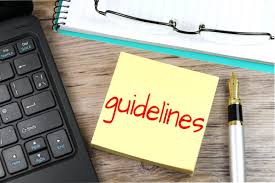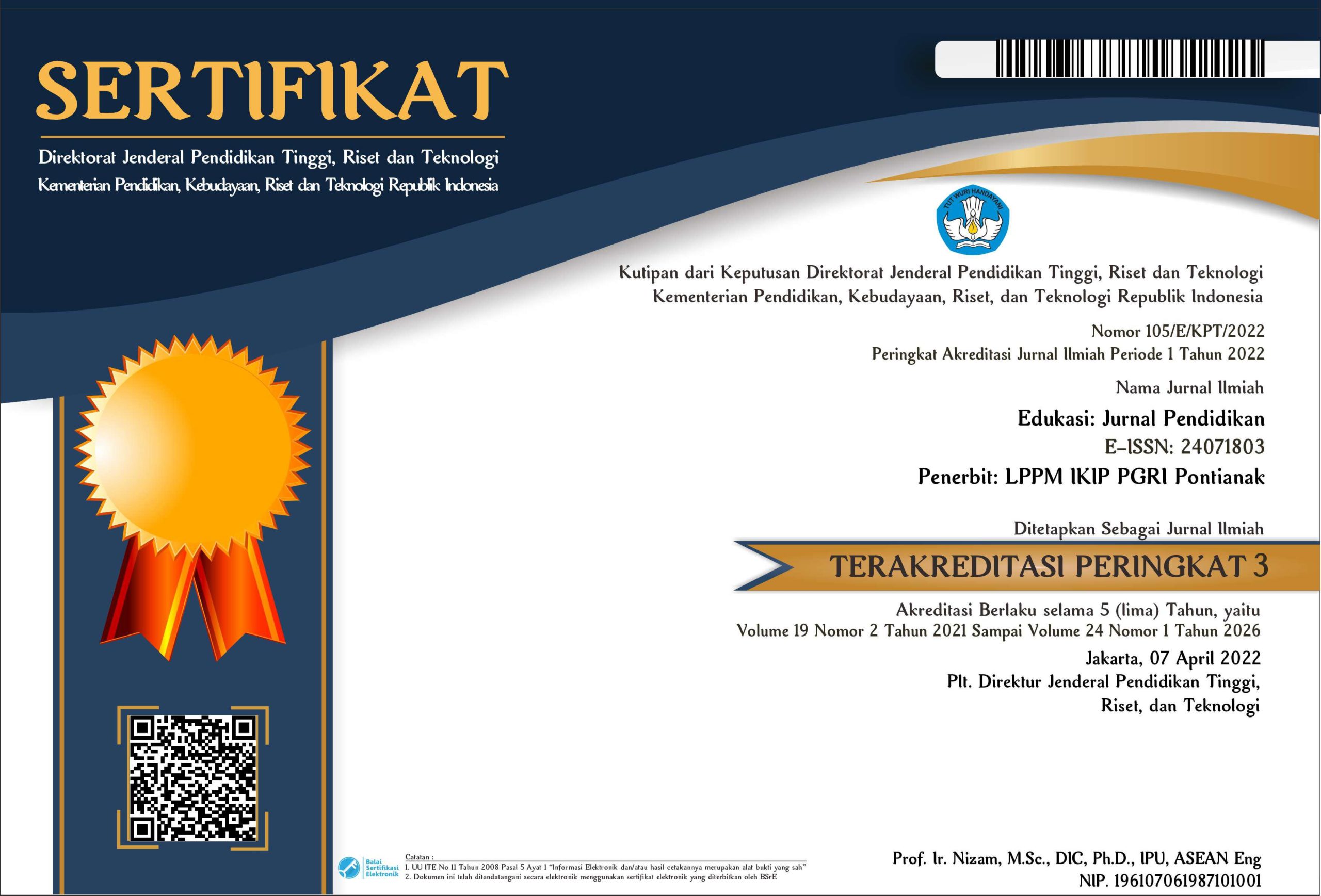- Focus and Scope
- Section Policies
- Peer Review Process
- Publication Frequency
- Open Access Policy
- Archiving
- Publication Ethic
- Plagiarism
- Abstracting and Indexing
- Crossmark Policy
Focus and Scope
Edukasi: Jurnal Pendidikan is a double-blind peer-reviewed scientific open access, with
e-ISSN 2407-1803 (electronic)
p-ISSN 1829-8702 (print)
published by LPPM IKIP PGRI Pontianak, Indonesia. The article contains the results of research and other scientific literature according to the field of its scientific work, especially related to higher and primary education in order to inspire and provide benefits for the wider community.
Focus and scope of this journal involving terms in education (but not limited to):
- teaching and learning
- curriculum
- educational development
- educational technology
- socio-culture
- language literacy
- science
- sports
- entrepreneurship
Section Policies
Research Article (Artikel Penelitian)
Systematic Review Article (Artikel Kajian)
Peer Review Process
Submitted papers are evaluated by anonymous referees through double-blind peer-reviewed for contribution, originality, relevance, and presentation. The Editor shall inform you of the results of the review as soon as possible, hopefully between 1 - 3 months. Please notice that may be paper submissions to Edukasi: Jurnal Pendidikan the duration of the review process can be up to 6 months.
Reviewer(s) examine the text of the aspects of quality and substance of the writing (not grammar texts), which includes the freshness, originality, usefulness, and validity of citations and bibliography.
If it is not according to their competencies, the reviewer is entitled to refuse the manuscript and recommend it to another more competent reviewer.
Publication Frequency
EDUKASI: Jurnal Pendidikan is a scientific research journal published two times a year in the following months June and December by LPPM IKIP PGRI Pontianak with e-ISSN 2407-1803 (electronic) and p-ISSN 1829-8702 (print). Every issue consists of at least 6 articles and therefore every volume has at least 12 articles/reviews.
Open Access Policy
EDUKASI: Jurnal Pendidikan is a peer-reviewed journal with open access. The article processing or delivery of the manuscript is submitted to the manager or editor through an online system or by using the OJS Open Access publishing model.
In this publishing model, papers are peer-reviewed in the normal way under editorial control. The paper appears electronically and is freely available on our website. Authors can also use articles that have been published in pdf format either for non-commercial use on a personal website or non-commercial institutions. Users have the right to read, download, copy, distribute, print, search, or link to the full text of articles

EDUKASI: Jurnal Pendidikan is licensed under a Creative Commons Attribution-NonCommercial 4.0 International License.
Archiving
This journal utilizes the LOCKSS system to create a distributed archiving system among participating libraries and permits those libraries to create permanent archives of the journal for purposes of preservation and restoration. More...
Publication Ethic
Edukasi: Jurnal Pendidikan is published twice a year, every June and December, containing articles about the ideas and research written by experts, educators, scientists, practitioners, and reviewers in the education discipline/study.
The statement of scientific publication code ethics is based on the LIPI Regulation Number 5 in 2014 about Scientific Publication Code Ethics, which uphold 3 ethnic values in publication, they are (i) neutrality, it is clear from conflict of interest in the publication processing; (ii) justice, it gives right to the writer to claim his/her papers; and (iii) Honesty, it is clear from duplicating, fabricating, falsification, and plagiarism (DF2P) in publication.
Duties and responsibilities of the editor-in-chief:
- Deciding the title of the journal, the study scope, the period, and accreditation if it is necessary.
- Arranging the membership of the editorial committee.
- Defining the relationship between the publisher, editor, experts, and other participants in the agreement.
- Respecting confidential things, whether it is for the contributed researchers, writers/authors, editors, and experts.
- Applying norms and conditions about the rights of intellectual property, especially the copyrights.
- Studying the journal policies and delivering them to the authors/writers.
- Creating code ethics guidance for editors and experts.
- Publishing the journal regularly.
- Giving guarantees the availability of funding sources for the continuity of journal publication.
- Setting networks and marketing.
- Preparing the license and other legalizing things.
Duties and Responsibilities of editors:
- Meeting the readers' and authors'/writers' requirements.
- Attempting to the increasing of publication quality continuously.
- Applying the process to assuring the quality of published papers/articles.
- Promoting freedom of ideas objectively.
- Maintaining the integrity of the academic track record of the authors/writers.
- Submitting corrections, clarifications, returning, and apologizing if necessary.
- Responsible for the style and form of the writing, whilst the content and any statements written in the writing are the responsibility of the writers/authors.
- Actively asking the writer/authors, readers, experts, and the editors' committee about their opinion and suggestion to increase the publication quality.
- Promoting the assessment to the journal for each finding.
- Supporting the ideas to decrease the research and publication errors by having the authors/writers enclose their Ethic Clearance forms that have been approved by the Ethic Clearance Commission.
- Participating in ideas to educate the researchers about publication ethics.
- Studying the effects of publication policies on the writers/authors and experts and fixing them in order to increase the responsibilities and minimize errors.
- Having an open-minded attitude toward new or other ideas which possibly oppose personal views.
- Do not force on his/her own view, authors/writers, or third parties view that can cause giving subjective decision.
- Motivate the authors/writers in order to do constructive improvement to have the proper publications.
Duties and responsibilities of reviewers:
- Commanding duties from the editors committee to review the papers and deliver the results to the editors to determine a properly-published paper.
- The reviewers cannot review a paper that involves himself/herself directly or indirectly.
- Keeping the privacy of the authors to not publish the corrections, suggestions, and recommendations by giving critics, suggestions, and recommendations.
- Encourage the authors/writers to do improvements to their papers.
- Review again the papers that have been reviewed based on the standards.
- The papers are reviewed in time based on the scientific standard form determined (Data collection method, the authorization of the author, conclusion, etc).
Duties and Responsibilities of the authors/writers:
- Ensure that the author who registers has met the requirements as an author.
- Collectively responsible for his profession and the content of the article including the method, analysis, calculation/measurement, and details.
- State the sources (including funds) directly or indirectly.
- Explain the limits in his/her writing.
- Give a response to the correction given by the expert professionally and on time.
- Inform the editor if she/he wants to cancel his/her participation.
Plagiarism
 All work in the manuscript should be free of any plagiarism, falsification, fabrications, or omission of significant material.
All work in the manuscript should be free of any plagiarism, falsification, fabrications, or omission of significant material.
Authors are expected to explicitly cite others' work and ideas, even if the work or ideas are not quoted verbatim or paraphrased. This standard applies whether the previous work is published, unpublished, or electronically available. Failure to properly cite the work of others may constitute plagiarism. Plagiarism in all its forms constitutes unethical publishing behavior and is unacceptable.
Provisions for handling plagiarism refer to the Committee on Publication Ethics (COPE - https://publicationethics.org).
Before the article is accepted, the article will check with iThenticate (https://www.ithenticate.com).
Abstracting and Indexing
EDUKASI: Jurnal Pendidikan is a scientific research journal published two times a year by LPPM IKIP PGRI Pontianak with e-ISSN 2407-1803 (online)and p-ISSN 1829-8702 (print).
This journal is indexed and archived by
- SINTA
- GARUDA
- Google Scholar
- Crossref
- Dimensions
- Scilit
- WorldCat
- Moraref
- BASE
- PKP Index
- Indonesia ONESearch
- JournalStories
- InfoBase Index
- ROAD
- IPI
- ORCid
- ISJD
- OpenAire
- DRJI
- scite_
- Index Copernicus International
- fatcat!
- Internet Archive Scholar
- IUPUI Libraries
- ResearchBib
- ScienceGate
- RootIndexing
- ESJI
- Exaly
- Semantic Scholar
- Wizdom
- Lens
- Advanced Sciences Index
- Academia
- Zenodo
Crossmark Policy
Crossmark is a multi-publisher initiative from Crossref to provide a standard way for readers to locate the current version of a piece of content. By applying the Crossmark logo LPPM IKIP PGRI Pontianak is committing to maintaining the content it publishes and to alerting readers to changes if and when they occur. Clicking on the Crossmark logo will tell you the current status of a document and may also give you additional publication record information about the document.














